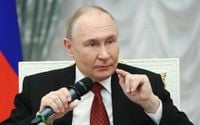On June 18, 2025, Larnaca Airport in Cyprus became a critical hub for evacuation efforts amid escalating tensions in the Middle East. Cyprus activated its emergency response plan to assist foreign nationals caught in the crossfire of the ongoing Israel-Iran conflict. Over 1,000 Israelis stranded in Cyprus were scheduled to return home on 13 special repatriation flights departing from Larnaca, according to Cypriot airport authorities.
The evacuation underscored the widening impact of the conflict, which has drawn in multiple global powers and heightened regional instability. As Israel launched attacks targeting Iran's nuclear infrastructure beginning June 13, 2025, the reverberations were felt far beyond the immediate battlegrounds, prompting urgent international responses.
Russian President Vladimir Putin has been a central figure in the diplomatic efforts surrounding this crisis. Immediately after Israel commenced its strikes, Putin engaged in conversations with both Iranian President Masoud Pezeshkian and Israeli Prime Minister Benjamin Netanyahu. The Kremlin released a statement expressing condolences to Iran for the loss of human life and condemning Israel's actions as violations of the United Nations Charter and international law. These remarks came on June 13, followed by another condemnation during a June 14 phone call with U.S. President Donald Trump, a known supporter of Netanyahu.
Despite Russia's vocal criticism of Israel, Moscow appears unlikely to extend direct military assistance to Iran. The relationship between Russia and Iran has strengthened over recent years, particularly following Russia's full-scale invasion of Ukraine in February 2022. Iran's recent accession to BRICS, a coalition of emerging economies that Russia helped establish, further cements their partnership. Western nations have accused Tehran of supplying Russia with military drones used in Ukraine, with reports indicating Moscow may have paid for these drones with approximately 1.8 tons of gold bars valued at around $104 million, transferred to the Iranian company Sahara Thunder.
In January 2025, Iran and Russia signed the Treaty on Comprehensive Strategic Partnership, which the Iranian parliament ratified following approval by the Russian legislature. However, this treaty stops short of a mutual defense pact. It commits both nations to refrain from assisting each other's adversaries but does not obligate military aid in case of an attack.
Analysts suggest that Russia’s stance is pragmatic. Middle East expert Marianna Belenkaya, who now resides in Israel, notes that Moscow has no pressing need to provide overt military support to Iran, especially as it seeks to mend ties with Washington. While covert involvement cannot be entirely dismissed, Russia appears focused on positioning itself as a mediator rather than a combatant.
Putin has publicly offered to mediate between Israel and Iran, proposing a negotiated settlement that would allow Tehran to pursue a peaceful atomic program while addressing Israeli security concerns. Speaking to senior international news agency leaders, Putin acknowledged the delicacy of the issue but expressed optimism: “In my view, a solution could be found.”
Putin also highlighted Russia's role in assisting Iran's nuclear energy development, noting that Moscow helped complete the construction of a nuclear power plant and is currently building two additional reactors. Over 200 Russian specialists are on-site, and security arrangements have been coordinated with Israeli leadership to prevent escalation.
When asked about the potential fallout if Israel were to assassinate Iran's Supreme Leader Ayatollah Ali Khamenei, Putin declined to comment, emphasizing his reluctance to entertain such scenarios. He stressed that Moscow's proposals have been shared with Iran, Israel, and the United States, emphasizing that Russia is not imposing solutions but offering a possible path forward.
These mediation efforts followed a June 14-15 phone call between Putin and former U.S. President Donald Trump. Trump, while initially open to Russia's role in mediating the Israel-Iran conflict, urged Putin to prioritize resolving Russia's own conflict in Ukraine. He reportedly told Putin, “Do me a favor, mediate your own,” and “Vladimir, let’s mediate Russia first. You can worry about this later.”
The timing of these diplomatic maneuvers is significant. On June 17, Russia launched one of its deadliest attacks on Kyiv in months, killing 14 and injuring dozens. Meanwhile, G7 leaders convened in Canada to address the escalating Middle East crisis, with German Chancellor Friedrich Merz emphasizing that the issue would be “very high on the agenda.” That same day, Trump met with Ukrainian President Volodymyr Zelenskyy, underscoring the interconnected nature of these global conflicts.
Experts believe the Kremlin may be leveraging the international focus on the Middle East to divert attention from its ongoing war in Ukraine. Ruslan Suleymanov, a Middle East analyst based in Cairo, remarked, “Against this backdrop, Putin may seize the opportunity to launch an offensive or cause some other kind of trouble.”
Russia’s balancing act in the Middle East is complex. It maintains warm relations with Israel while nurturing strategic, economic, and military ties with Iran. This dual approach positions Moscow as a potential power broker capable of influencing outcomes in the region. Russia's involvement in indirect U.S.-Iran talks earlier in 2025, including the prospect of hosting Iran’s stockpile of highly enriched uranium and serving as an impartial arbiter in case of agreement breaches, illustrates this role.
As Cyprus facilitates the safe return of hundreds of Israelis stranded amid the conflict, the international community watches closely. The unfolding events highlight the fragile nature of peace in the region and the intricate web of alliances and rivalries that define it. Whether Putin’s mediation efforts will bear fruit remains uncertain, but the global stakes have never been higher.

